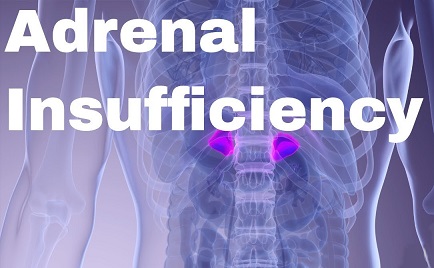BREAKING NEWS! Thailand Medical Scientists From Chulabhorn Hospital Discover That COVID-19 Infections May Lead To Adrenal Insufficiency In Many
Thailand Medical - COVID-19 Infections - Adrenal Insufficiency Jul 29, 2023 1 year, 8 months, 3 weeks, 1 day, 7 hours, 34 minutes ago
Many Post-COVID Individuals could be suffering from hypocortisolism that is contributing to Long COVID manifestations.
Thailand Medical: In a groundbreaking study conducted by medical scientists from Chulabhorn Hospital in Thailand, a leading hospital and research center, it has been revealed that
COVID-19 infections may have far-reaching consequences beyond the acute phase of the illness. The researchers have found evidence suggesting a potential link between COVID-19 pneumonia and the development of adrenal insufficiency (AI), a condition that affects the adrenal glands' ability to produce vital hormones.

Adrenal insufficiency occurs when the adrenal glands don't make enough of the hormone cortisol.
Adrenal insufficiency typically leads to the condition known as hypocortisolism which can give rise to manifestations of the following symptoms:
-Extreme fatigue
-Weight loss and loss of appetite
-Areas of darkened skin
-Low blood pressure, even fainting
-Salt craving
-Low blood sugar, also called hypoglycemia
-Nausea, diarrhea or vomiting-
-Abdominal pain
-Muscle and joint pain
-Irritability
-Depression
-Body hair loss or sexual issues in some people
Adrenal insufficiency also leads to the downregulation of steroid hormones and also aldosterone.
The study aimed to evaluate the prevalence of adrenal insufficiency (AI) in patients with a history of COVID-19 pneumonia. A total of 41 patients aged 18 years and above, who had confirmed cases of COVID-19 pneumonia based on radiography, were included in the cross-sectional study. Patients who had been treated with glucocorticoids in the past or were using oral contraceptives were excluded from the study to ensure accurate evaluation of adrenal function.
The results of the study were quite alarming. Out of the 41 patients, all of whom had severe pneumonia at the baseline, 11 patients (27%) were diagnosed with AI based on evidence of hypocortisolism. Hypocortisolism is characterized by low levels of cortisol, a hormone produced by the adrenal glands essential for various bodily functions. Further analysis showed that 10 out of these 11 patients (91%) had secondary AI, indicating disruption in the pituitary gland, which regulates adrenal function, and one patient had primary adrenal insufficiency (AI), suggesting a direct issue with the adrenal glands themselves.
Interestingly, a majority of the patients with AI reported experiencing persistent fatigue (54.5%). Additionally, 45.5% of the patients with adrenal insufficiency (AI) required regular replacement of glucocorticoids, the hormones usually produced by the adrenal glands. These findings point to the potential long-term effects of COVID-19 on the endocrine system, especially the hypothalamic-pituitary-adrenal (HPA) axis.
The HPA axis is a complex system responsible for regulating the body's response to stress and maintaining essential hormonal balance. The study's authors speculate that the virus's interaction with the ACE2 receptor, which is used to enter human cells, could be a
possible mechanism underlying the development of AI. The ACE2 receptor has been found in various human tissues, including the adrenal and pituitary glands, making them susceptible to viral infection.
Previous coverages by
Thailand Medical News had shown that the SARS-CoV-2 virus is able to infect the adrenal and pituitary glands.
https://www.thailandmedical.news/news/breaking-german-and-swiss-study-discovers-sars-cov-2-targets-and-causes-cellular-damage-to-adrenal-glands-resulting-in-a-variety-of-health-conditions
https://www.thailandmedical.news/news/coronavirus-news-tiredness-and-fatigue-in-the-covid-19-era-could-be-due-to-addison-s-disease-as-sars-cov-2-also-attacks-the-adrenal-glands
https://www.thailandmedical.news/news/unpacking-the-science-behind-long-covid-how-adrenal-gland-sars-cov-2-infection-may-play-a-key-role
https://www.thailandmedical.news/news/breaking-news-italian-study-reveals-that-sars-cov-2-is-able-to-affect-the-pituitary-gland-leading-to-possible-hypopituitarism-and-a-variety-of-disorde
Moreover, the study also highlighted that patients with higher body mass index (BMI) were more at risk of developing adrenal insufficiency (AI). The reasons behind this association could be linked to higher ACE2 expression in adipose tissue, potentially leading to increased viral damage to the endocrine glands. Obesity is known to be a significant risk factor for severe COVID-19, and this finding adds another layer of complexity to the relationship between the virus and hormonal imbalances.
While this study provides valuable insights into the potential impact of COVID-19 on the
endocrine system, the researchers acknowledge some limitations. The sample size was relatively small, and the study was conducted at a single center, making it important to conduct further research with larger sample sizes to validate the findings. Additionally, all participants in the study had severe COVID-19 pneumonia, and the results may not fully represent patients with milder forms of the disease.
The discovery of a potential link between COVID-19 and adrenal insufficiency raises important questions about the long-term health effects of the virus. It underscores the need for close monitoring of patients with a history of COVID-19 pneumonia and highlights the importance of considering AI as a potential diagnosis for those presenting with clinical symptoms such as shock, nausea, vomiting, and fatigue.
As the medical community continues to grapple with the complexities of COVID-19 and its lingering effects, further research will be necessary to fully understand the mechanisms behind adrenal insufficiency (AI) development following SARS-CoV-2 infection. It will also be crucial to study the persistence of adrenal insufficiency (AI) and its recovery rate in patients with long COVID syndrome. This new knowledge may pave the way for more effective strategies to manage and mitigate the long-term health consequences of COVID-19.
In conclusion, this groundbreaking study from Chulabhorn University in Thailand provides significant insights into the potential impact of COVID-19 on adrenal function. It highlights the importance of considering adrenal insufficiency (AI) as a possible complication in patients with a history of COVID-19 pneumonia and emphasizes the need for continued research to better understand the long-term effects of the virus on the endocrine system. As the world grapples with the ongoing COVID-19 pandemic, this research will undoubtedly contribute to our understanding of the virus and inform future approaches to managing and treating COVID-19-related health complications.
The study findings were published on a preprint server but is currently being peer reviewed for publication into the journal: Scientific Reports.
https://www.researchsquare.com/article/rs-3157398/v1
For details about Chulabhorn Hospital:
https://www.chulabhornhospital.com/
For the latest COVID-19 News, keep on logging to
Thailand Medical News.
Read Also:
https://www.thailandmedical.news/news/thailand-medical-news-warns-that-covid-19-infections-and-covid-19-vaccines-can-cause-pituitary-apoplexy-and-possibly-pituitary-adenomas
https://www.thailandmedical.news/news/new-study-shows-that-epstein-barr-virus-reactivation-and-low-cortisol-levels-are-common-in-many-long-covid-patients
https://www.thailandmedical.news/news/first-documented-long-covid-case-study-involving-impaired-secretion-of-adrenocorticotropic-hormone-due-to-sars-cov-2-infection
https://www.thailandmedical.news/news/university-of-cambridge-researchers-discover-that-hospitalized-covid-19-patients-typically-exhibit-extreme-hypoaldosteronism
https://www.thailandmedical.news/news/breaking-french-covid-19-research-reveals-that-the-hypothalamus-region-of-the-brain-is-also-a-target-for-the-sars-cov-2-coronavirus
